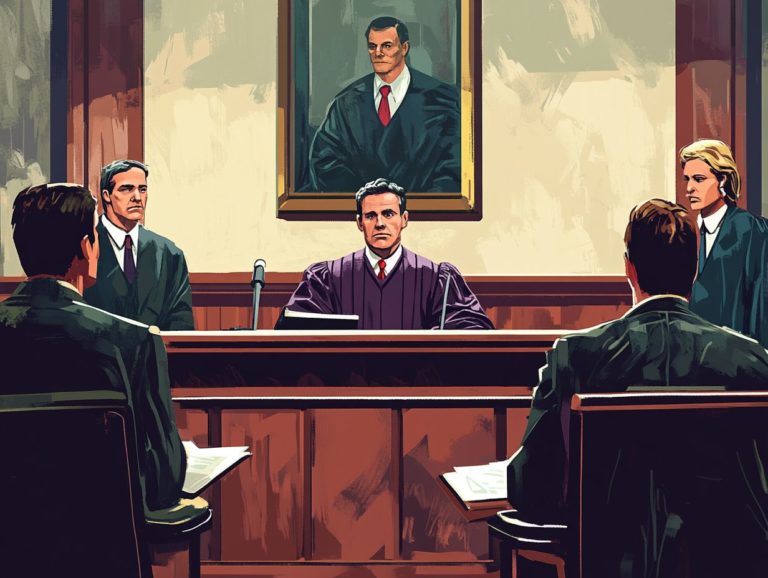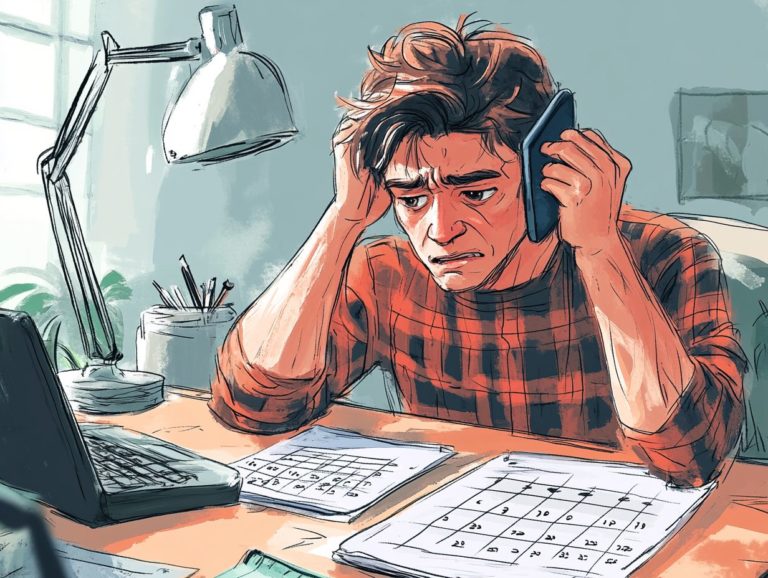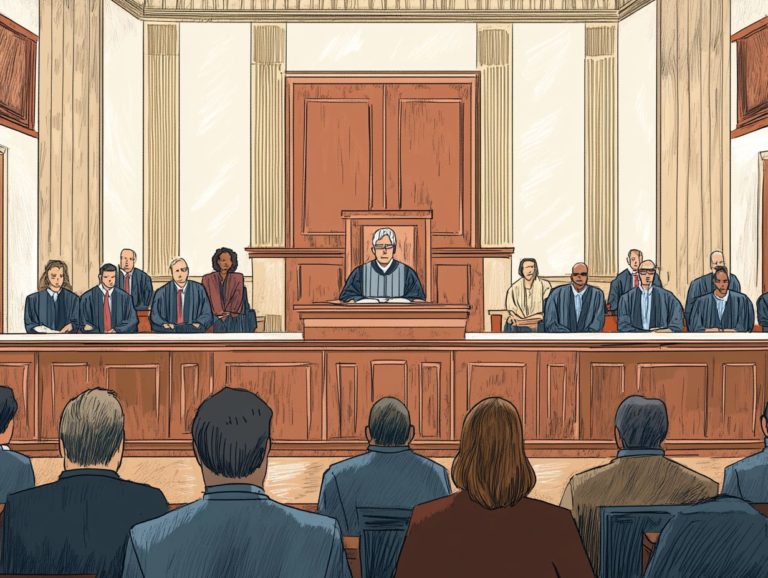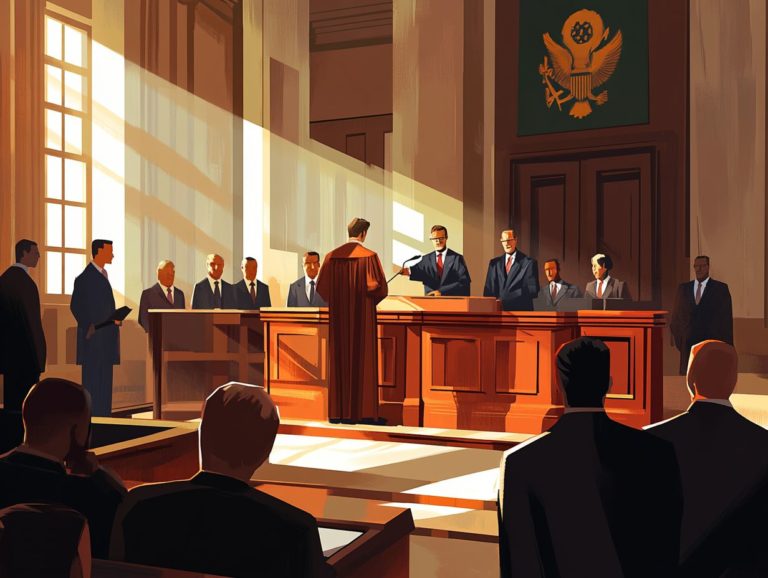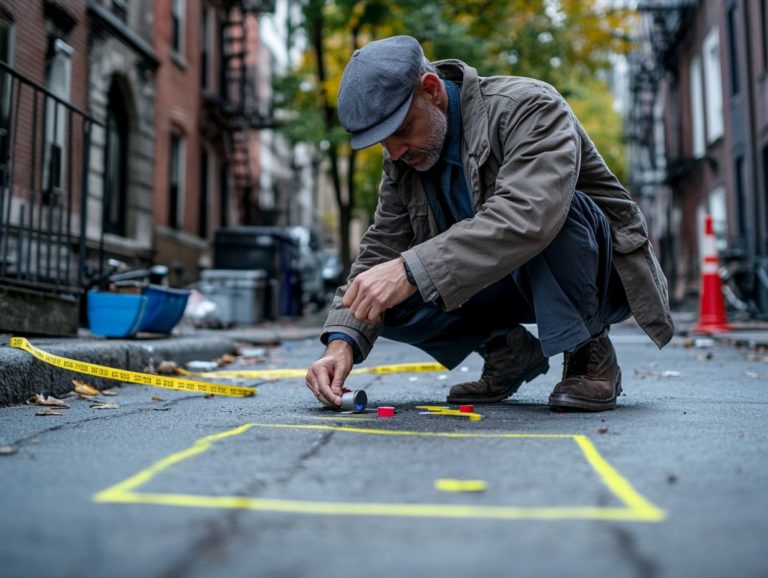How Does the Jury Selection Process Work?
Jury selection is a pivotal aspect of the legal system, laying the groundwork for fair trials. It involves determining eligibility and navigating biases and demographics, ensuring that juries are both impartial and reflective of the community.
This discussion delves into the complexities of jury selection, covering the qualifications required for jury duty, the jury questioning process, and the strategies employed to assemble an unbiased jury.
Gaining insight into these elements is crucial for anyone with an interest in the justice system and its unwavering commitment to fairness.
Contents
- Key Takeaways:
- The Importance of Jury Selection
- Eligibility for Jury Duty
- The Jury Selection Process
- Factors Considered in Jury Selection
- Ensuring an Impartial Jury
- Closing Arguments and Jury Deliberation
- Frequently Asked Questions
- 1. How does the jury selection process work in the United States?
- 2. What happens during the jury selection process?
- 3. How are jurors selected for a particular case?
- 4. Who is not eligible to serve on a jury?
- 5. How long does the jury selection process typically last?
- 6. Can someone be exempt from jury duty?
Key Takeaways:
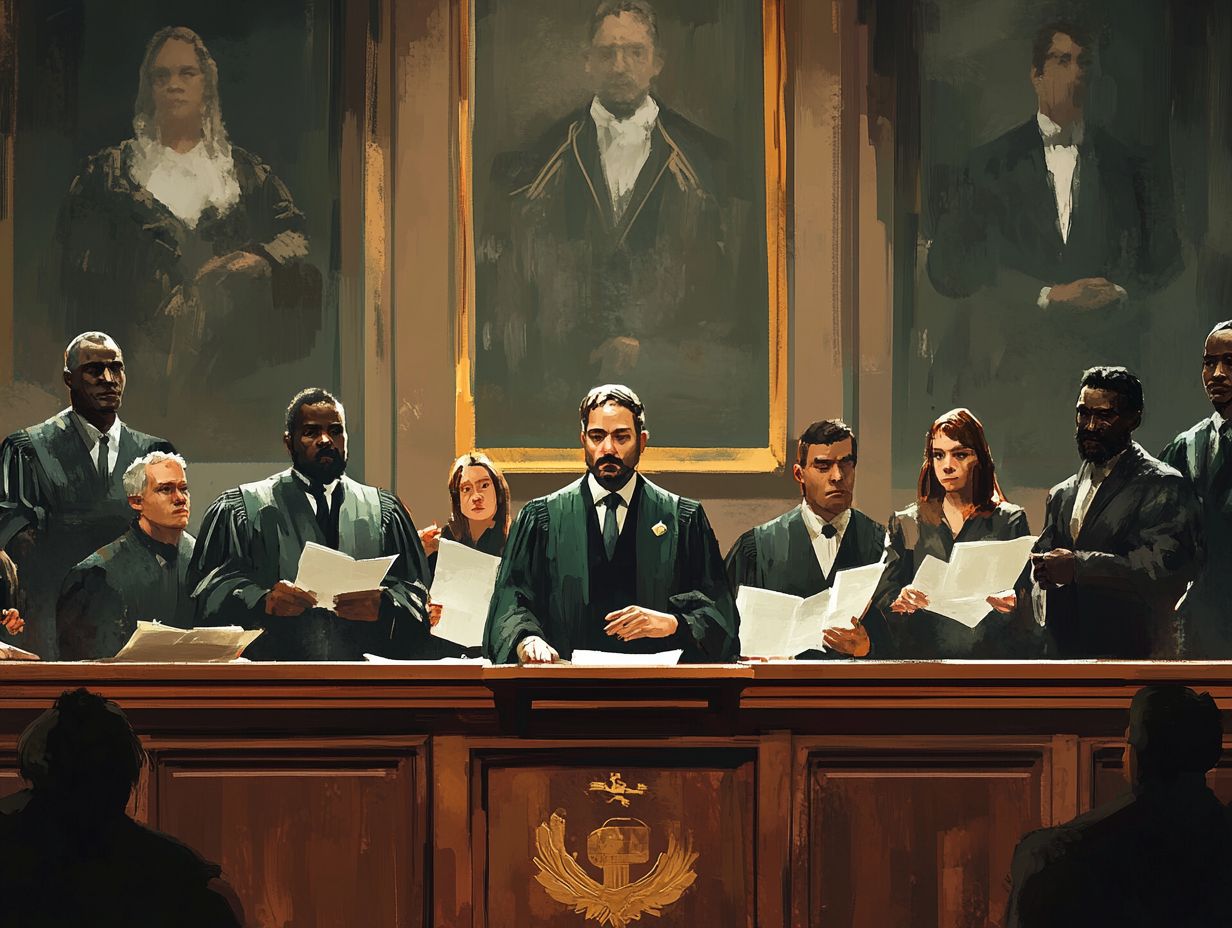
The jury selection process is vital! It directly influences the fairness of trials by choosing impartial jurors.
Eligibility for jury duty is based on qualifications and exemptions, with certain groups being excluded.
During the selection process, jurors are questioned and can be challenged for cause or peremptorily, taking into account demographics, attitudes, and biases.
The Importance of Jury Selection
Jury selection serves as a cornerstone of the criminal justice system, ensuring that each trial unfolds with fairness and impartiality essential elements for preserving public trust in the legal process.
The jury selection process involves careful evaluation of potential jurors, examining their backgrounds and beliefs. This careful approach is especially vital in high-stakes criminal cases.
In these cases, the government must prove its case, and the outcomes can greatly impact everyone involved.
Eligibility for Jury Duty
Eligibility for jury duty hinges on specific criteria established by the government. Generally, you must be at least 18 years old, a resident of the jurisdiction, and proficient in English.
It’s worth noting that the Americans with Disabilities Act provides certain exemptions, allowing individuals facing financial hardships or specific disabilities to be excused from service.
The Jury Selection Process
The jury selection process in criminal cases is a meticulous endeavor that starts with the jury questioning process a key phase where potential jurors undergo questioning by both the prosecutor and the defense attorney.
This critical stage enables the judge and attorneys to unearth any biases or prejudices that might hinder a juror’s capacity to deliver an impartial verdict.
Through this process, they can employ both challenges for cause and peremptory challenges, ensuring that the selection is as fair and just as possible.
Voir Dire and Questioning Potential Jurors
The jury questioning process is an essential part of the jury selection where you, as an attorney, question potential jurors to uncover any biases that might hinder their ability to serve impartially in a trial.
This phase allows both the prosecutor and the defense attorney to assess jurors’ perspectives, helping determine their suitability based on their responses and demeanor.
Utilizing specific questioning techniques, such as open-ended inquiries and targeted follow-ups, you can uncover the underlying beliefs and attitudes that potential jurors may hold.
This exploration is vital, as jurors’ answers can unveil personal experiences, biases, and even preconceived notions about the case at hand.
By identifying these factors early on, legal teams can make informed choices about which jurors might threaten the integrity of the trial.
Ultimately, a comprehensive jury questioning process not only enhances the jury’s composition but also upholds the fairness and objectivity that are fundamental to the justice system.
Challenges for Cause and Peremptory Challenges
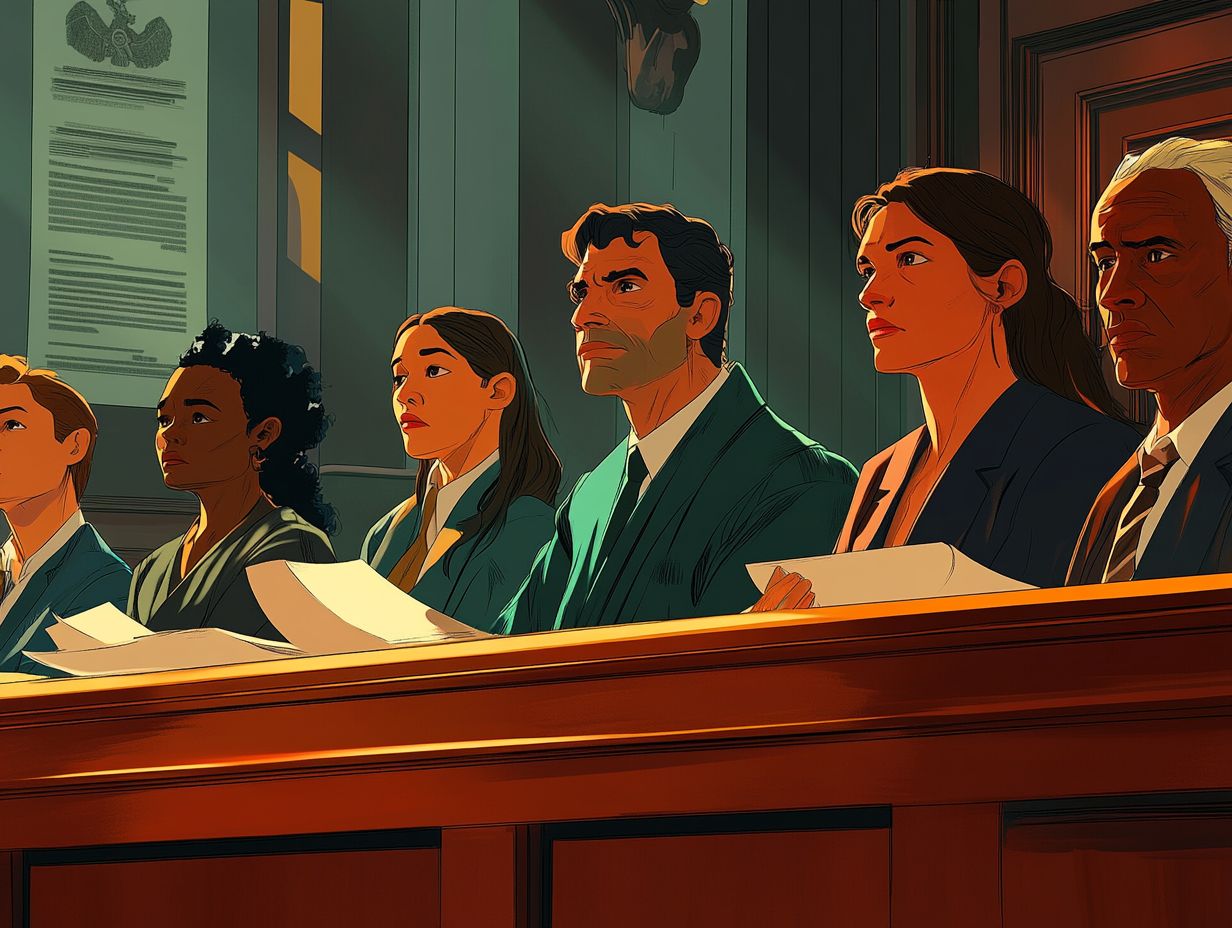
During jury selection, you wield challenges for cause and peremptory challenges like an artist with a fine brush. You craft an impartial jury that serves justice.
A challenge for cause emerges when you present a specific reason to dismiss a juror. This signals that their potential bias disqualifies them.
In contrast, a peremptory challenge allows you to remove jurors without offering an explanation. This ensures that any lurking bias is effectively weeded out from the jury pool.
Challenges for cause and peremptory challenges serve different purposes. They shape the jury s makeup and influence decisions.
You typically employ challenges for cause when a juror shows undeniable bias think personal experiences that could cloud their judgment.
Peremptory challenges often involve strategy. They enable you to remove individuals based on instincts or subtle inferences rather than overt bias.
The overall effect of these challenges can dramatically transform the jury’s makeup. This affects not only the trial’s perceived fairness but also its ultimate outcome.
Factors Considered in Jury Selection
In the intricate process of jury selection, several crucial factors come into play. Attorneys meticulously evaluate demographics, personal characteristics, and potential jurors’ attitudes.
This careful consideration is vital for assembling an impartial jury that reflects a fair cross-section of the community. A balanced representation is essential for achieving a credible outcome in any trial.
Demographics and Personal Characteristics
Demographics and personal characteristics, such as age, race, gender, and occupation, are essential factors in the jury selection process. These attributes can significantly shape jurors’ perspectives.
A jury composed of individuals from diverse backgrounds interprets evidence and narratives differently. Each juror brings their own preconceptions to the table.
This diversity enriches the deliberation process. It fosters an environment where jurors challenge each other’s biases and assumptions.
Conversely, a homogenous jury might reinforce existing biases, potentially leading to skewed verdicts. Ensuring varied demographics enhances the deliberative experience.
This representation bolsters public confidence in the justice system, underscoring its commitment to fairness and equity in legal proceedings.
Attitudes and Biases
Grasping the attitudes and biases of potential jurors is crucial! It s a key step toward a fair jury selection process.
During voir dire, pay close attention to jurors’ responses. Seek out subtle cues that hint at preexisting judgments or predispositions.
Biases whether implicit or explicit can easily sway a jury’s deliberations and shape the verdict.
To counteract these influences, legal representatives often deploy strategies. They craft tailored questions aimed at uncovering hidden prejudices.
Using challenges for cause or peremptory challenges, they remove potentially biased jurors. This pursuit leads to a more balanced and fair jury composition.
This meticulous approach helps safeguard the integrity of the judicial process.
Ensuring an Impartial Jury
Ensuring an impartial jury is essential for maintaining the integrity of the judicial process. Various strategies can prevent bias and prejudice from influencing jurors’ decisions.
By meticulously selecting jurors and employing rigorous questioning techniques during voir dire, both defense attorneys and prosecutors can foster a trial environment that is truly fair and unbiased.
Strategies for Avoiding Bias and Prejudice
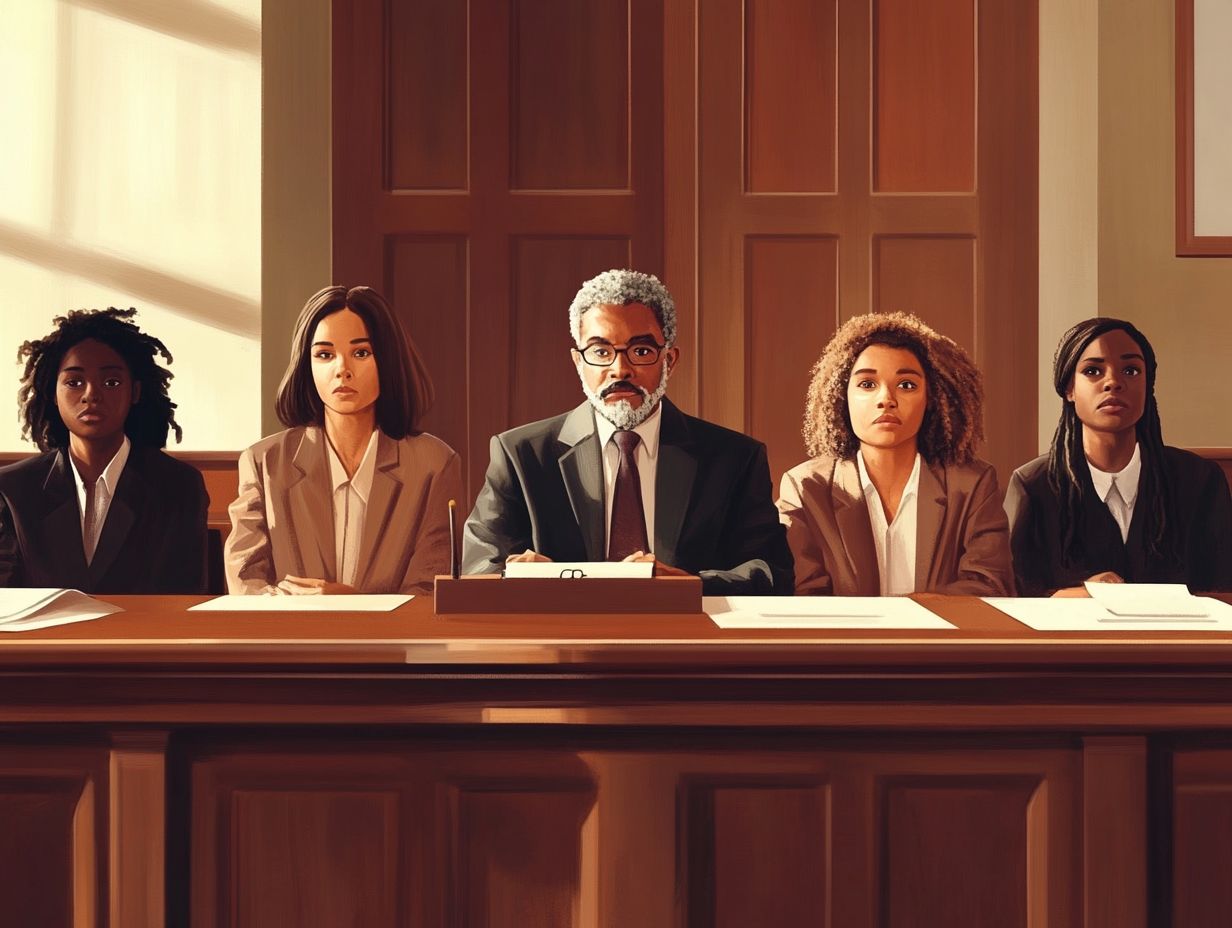
You can use several strategies to reduce bias during jury selection. This ensures jurors evaluate the trial evidence with an open mind.
Legal professionals often conduct pre-trial surveys to assess jurors’ views. This helps them challenge potential jurors for valid reasons.
Successful cases show that these methods encourage fair assessments. They also protect the defendant s right to an unbiased jury.
Closing Arguments and Jury Deliberation
Closing arguments represent a critical moment in a trial. This is your chance to summarize the evidence and persuade the jurors toward a favorable verdict.
Now is your moment to shine! Capture the jury’s attention and make your point clear. After these arguments, the jury will deliberate, analyzing the case and reflecting on the evidence before deciding the defendant’s fate.
Understanding the Verdict
Your final decision reflects your assessment of the evidence and whether the defendant is guilty or not guilty. Remember, the prosecution must prove the defendant’s guilt clearly.
This process is also vital for the legal system. You and your fellow jurors engage in discussions, weighing witness credibility and tangible evidence to ensure thorough scrutiny.
A fair trial is essential for justice and public trust. When you fulfill your role with integrity, you contribute to protecting the innocent and holding the guilty accountable, maintaining a balance between societal order and individual rights.
Frequently Asked Questions
1. How does the jury selection process work in the United States?
The jury selection process begins with creating a pool of potential jurors, usually through voter registration or driver’s license records. From this pool, a group of potential jurors is randomly selected and summoned for jury duty.
2. What happens during the jury selection process?
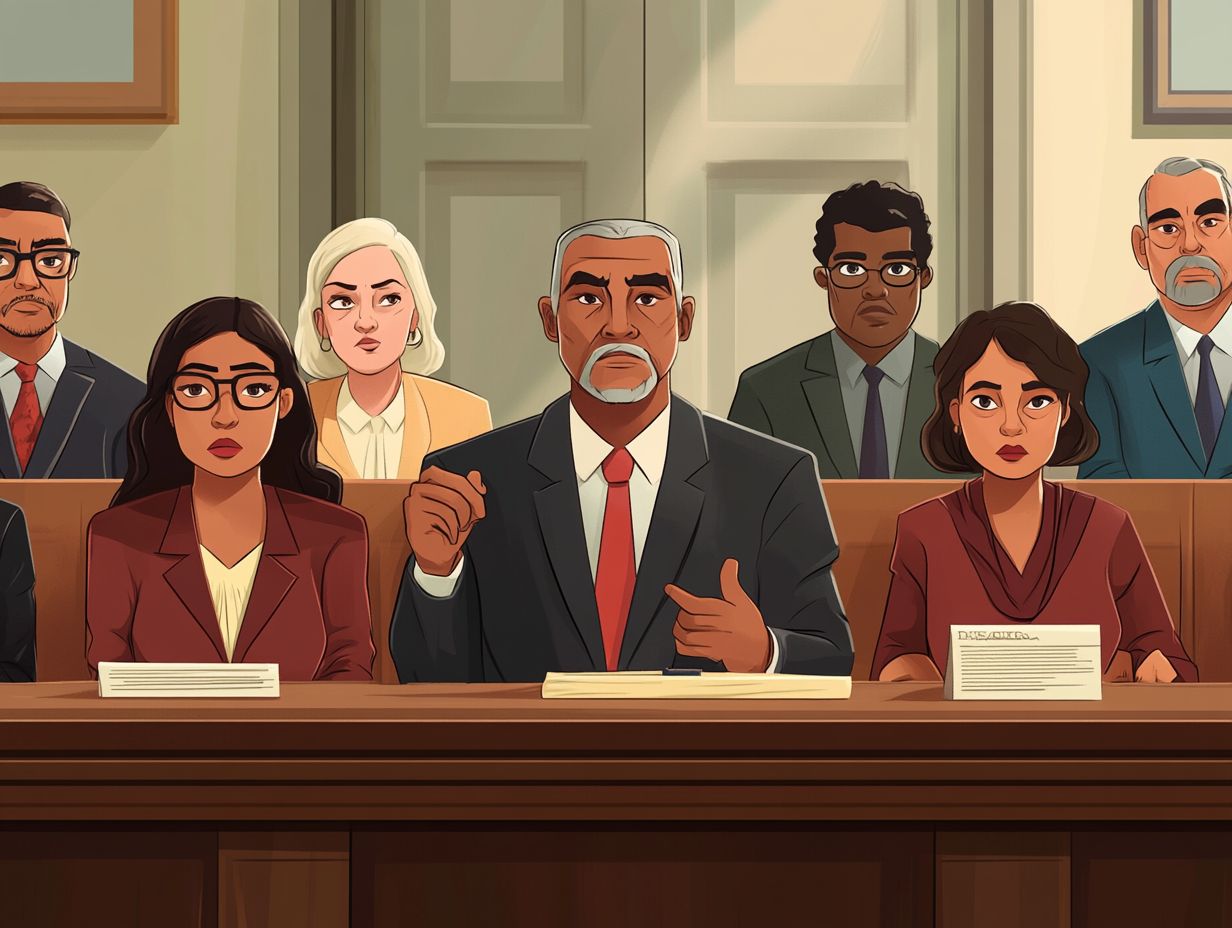
During jury selection, potential jurors are questioned by the judge and attorneys from both sides to determine their ability to be impartial. This process, known as voir dire, selects a fair jury for the trial.
3. How are jurors selected for a particular case?
Jurors are selected through a process called empanelment. Once the voir dire is complete, attorneys can accept or challenge potential jurors. The judge selects the final jurors from those accepted.
4. Who is not eligible to serve on a jury?
Individuals ineligible to serve on a jury include convicted felons, those with disabilities preventing service, and those not proficient in the trial language.
5. How long does the jury selection process typically last?
The duration of jury selection varies based on case complexity and jurors needed. It can take anywhere from a few hours to several days. In some cases, potential jurors may be dismissed before the process concludes.
Ready to learn more about your role as a juror? Stay informed!
6. Can someone be exempt from jury duty?
Jury duty is important, but sometimes you may not need to serve.
Exemptions can be based on age, occupation, or personal hardship. Make sure to check your state’s rules to see if you qualify for an exemption!

